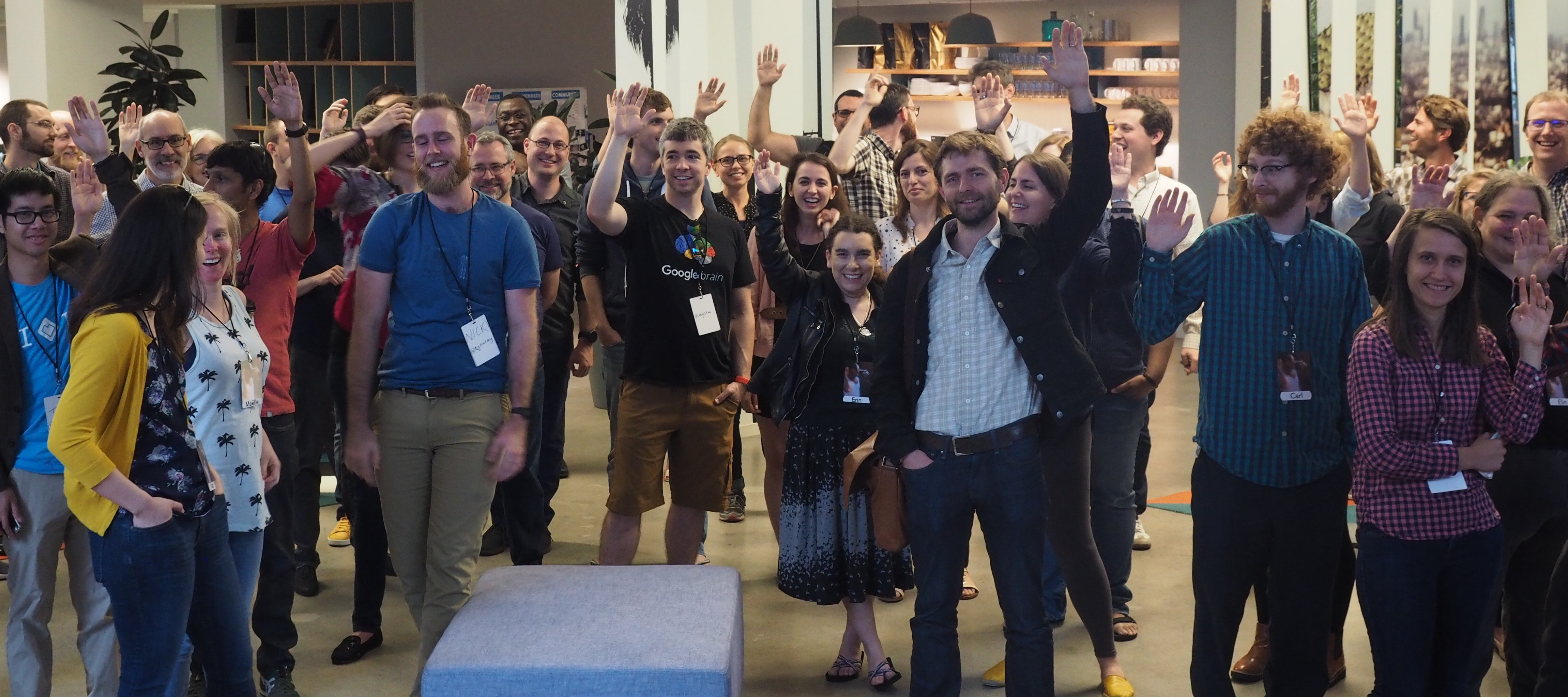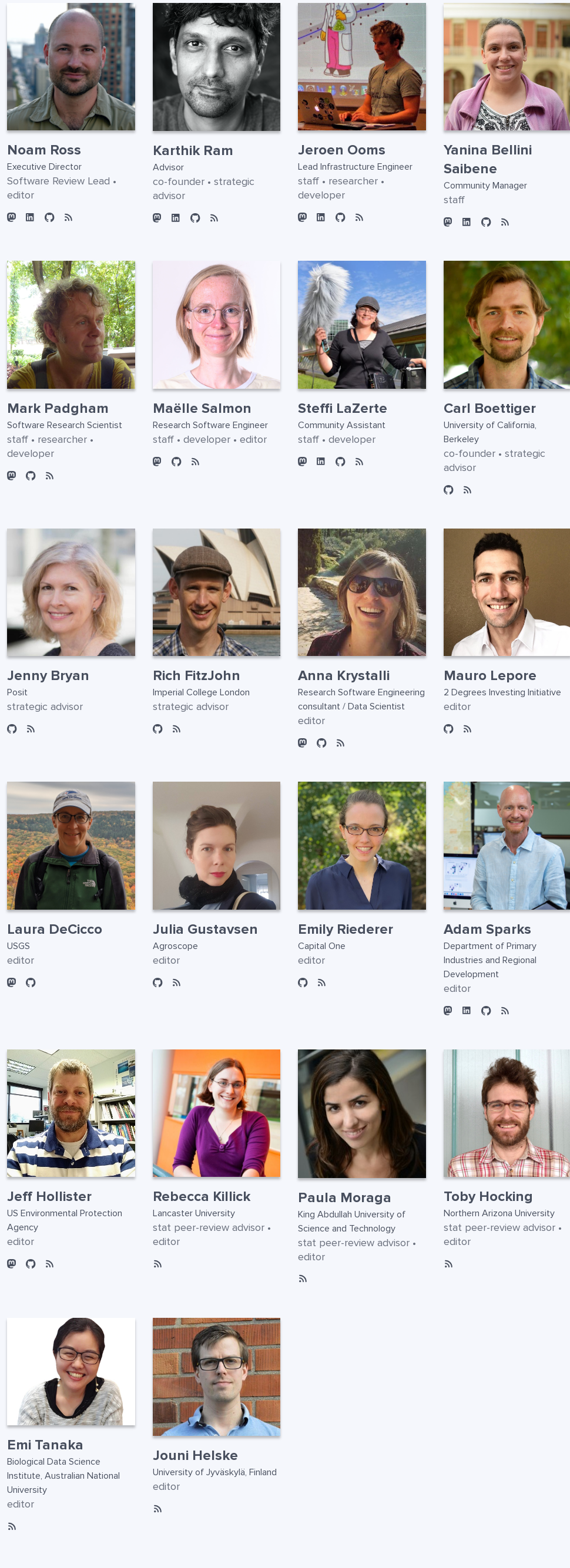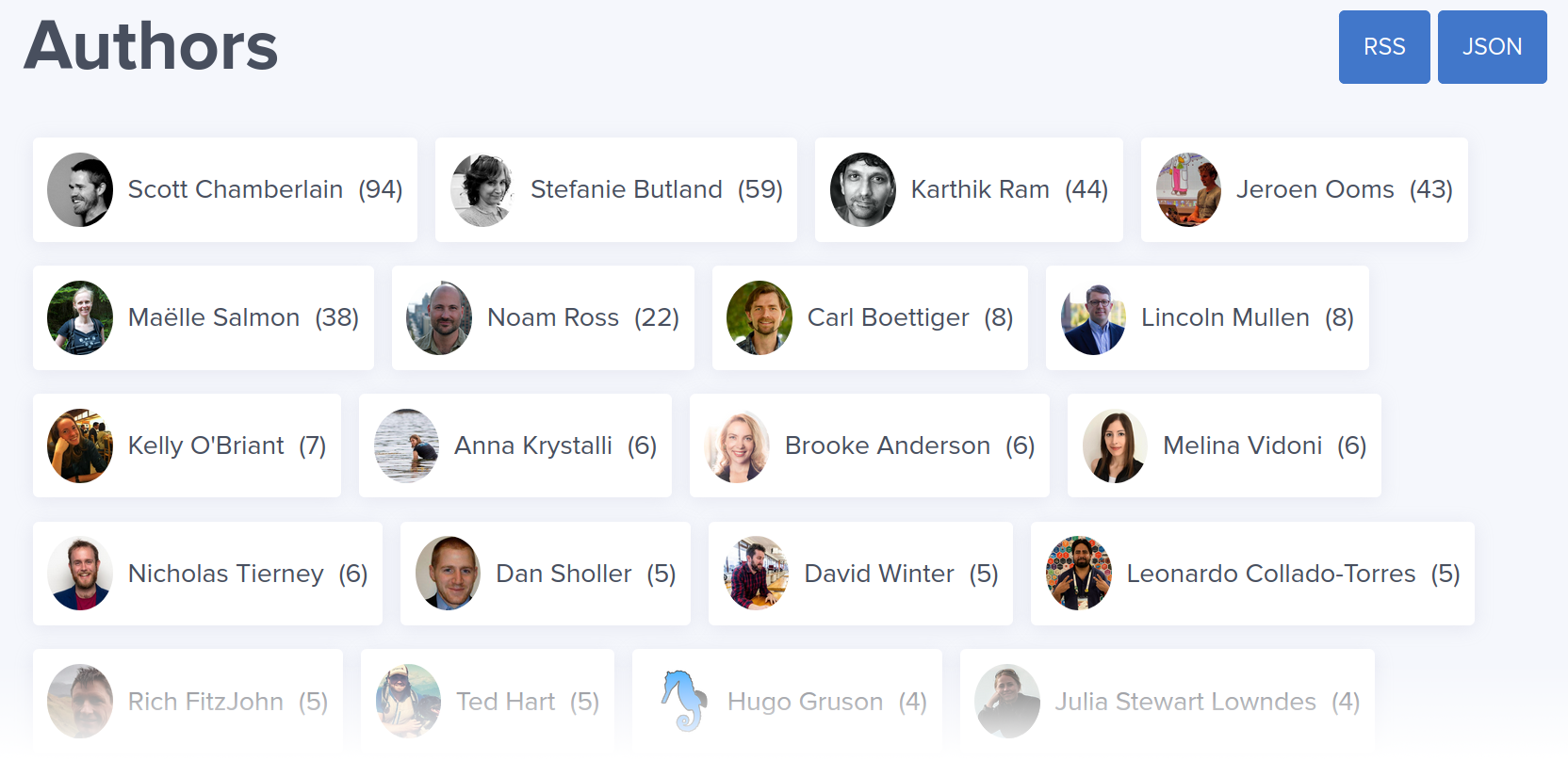https://ropensci.org/about/ screenshot completed1 rOpenSci & Our Community
1.1 Our Mission
Our work is driven by our vision and mission.
rOpenSci fosters a culture that values open and reproducible research using shared data and reusable software.
We do this by:
- Creating technical infrastructure in the form of carefully vetted, staff- and community-contributed R software tools that lower barriers to working with scientific data sources on the web, and the R-universe to enhance the publication and discovery of research software in R.
- Creating social infrastructure through a welcoming and diverse community, enhanced by mentoring and localization efforts for broader inclusivity and accessibility.
- Making the right data, tools and best practices more discoverable
- Building capacity of software users and developers and fostering a sense of pride in their work
- Promoting advocacy for a culture of data sharing and reusable software
Our goal is to build confidence and a sense of belonging for people of all backgrounds, particularly those who might not see themselves as software developers (as many scientists may not!). We do this through building trust and establishing shared norms for working openly, leveraging and creating open source software and resources that support open, reproducible science.
Everyone in the community, no matter how accomplished they are in their own specialty, comes with a mind open to learning from, with, and for each other. We learn from others by using their code and documentation, their blogs and tutorials, their talks and webinars. We learn with others online through Twitter, discussion forums and Slack channels, and in person through coding clubs, hacky hours, meetups, workshops and conferences. And we learn for others by writing tutorials and blogs about our own learning processes, or adding or fulfilling feature requests, which we can then contribute back to the community.
Julia Stewart Lowndes in “Open Software Means Kinder Science”
1.2 Our Community
Our community is our best asset! Without the secret sauce that is the Humans of rOpenSci, we’re just a lot of (really good) packages and processes. Our community is an ephemeral thing. It’s everywhere and nowhere. It’s people who believe in our mission and share our values, and have a mindset for learning, improving, and innovating together. It’s people who prioritize open, reusable, and reproducible research software while also prioritizing creating inclusive spaces through empathy and building trust. There are no stupid questions at rOpenSci; everyone appreciates the diversity of expertise and entryways to coding in this thing we love called R.
The rOpenSci community is a self-identifying group composed of users and developers of R software tools who, together, contribute to the technical and social infrastructure for open and reproducible research. Our specific focus is on software and best practices that lower the barriers to working with scientific data sources. Community members are people who use, cite and share use cases for rOpenSci packages, attend or present in our Community Calls, write a post for our blog, participated in an rOpenSci unconf, or in our research domain focused communities like rOpenSci-Antarctic and Southern Ocean Research, answer questions in our fora, actively participate in the life of an rOpenSci project reporting problems and recommending or implementing solutions, contribute to, or maintain a package, are Champions, mentors or trainers in our Champions Program, localize our material, or participate in rOpenSci peer review as a reviewer, author or editor.
Having a diverse community is important to us. We welcome anyone dedicated to making their science more open and supporting others in that pursuit, no matter their technical expertise, career stage, or work sector. Further, we welcome people of all backgrounds, including but not limited to any sexuality, gender identity, and race. We are anti-racist. We recognize that communities are not inclusive by default, particularly as they grow: they require deliberate attention. We are carrying out a Champions Program and Localization projects to ensure our research software serves everyone in our communities. We are all supported by rOpenSci’s Community Manager and a Code of Conduct that has clear guidelines for behavior and reporting, and is enforced by a committee including rOpenSci staff and an independent community member.
1.2.1 Humans of rOpenSci
In this section we point to groups of people with various formal and informal roles in our community. This gives some transparency, may help people “recognize themselves” in some roles, and provide a foundation to allow folks to reach out to others to learn about making contributions.
rOpenSci was founded in 2011 by Karthik Ram, Scott Chamberlain, and Carl Boettiger, ecologists who were motivated to make scientific data retrieval reproducible.
Staff are:
Noam Ross (Executive Director), Jeroen Ooms (Lead Infrastructure Engineer), Yanina Bellini Saibene (Community Manager), Mark Padgham (Software Review Lead), Maëlle Salmon (Research Software Engineer) and Steffi LaZerte (Community Assistant) .
Scott Chamberlain (Technical Lead), Stefanie Butland (Community Manager) and Stacey Dorton (Administrative Manager) are Staff alumni.
Strategic Advisors
Karthik Ram (Advisor), Carl Boettiger (University of California, Berkeley), Jenny Bryan (Posit) and Rich FitzJohn (Imperial College London) volunteer their time.
Software peer review Editors
Noam Ross (Executive Director), Mark Padgham (Software Review Lead), Maëlle Salmon (Research Software Engineer), Anna Krystalli (Research Software Engineering consultant / Data Scientist), Mauro Lepore (Theia Finance Labs), Laura DeCicco (USGS), Emily Riederer (Capital One), Adam Sparks (Curtin University), Jeff Hollister (US Environmental Protection Agency), Rebecca Killick (Lancaster University), Toby Hocking (Northern Arizona University), Emi Tanaka (Biological Data Science Institute, Australian National University), Jouni Helske (University of Jyväskylä, Finland), Beatriz Milz (Federal University of ABC (UFABC), Brazil), Margaret Siple (NOAA AFSC Groundfish Assessment Program - RACE division), Nima Hejazi (Harvard Chan School of Public Health) and Andrew Heiss (Georgia State University) volunteer their time.
Scott Chamberlain (Technical Lead), Lincoln Mullen (George Mason University), Brooke Anderson (Colorado State University), Melina Vidoni (RMIT University), Julia Gustavsen (Agroscope), Ben Bolker (McMaster University), Stephanie Hicks (Johns Hopkins University), Paula Moraga (King Abdullah University of Science and Technology) and Leonardo Collado-Torres (Lieber Institute for Brain Development) are Editor alumni.
Read posts introducing Laura DeCicco, Julia Gustavsen, Mauro Lepore, Brooke Anderson and Melina Vidoni, and Anna Krystalli and Lincoln Mullen. We occasionally recruit guest editors for some package reviews.
Get to know some of the more experienced folks in our community by reading the .Rprofile series of posts for which Kelly O’Briant interviewed Mara Averick, Jenny Bryan, Julia Stewart Lowndes (with assistance from Sean Kross), Karthik Ram, Noam Ross, Julia Silge, and David Smith.
You can also have a look at some of the teams and people behind the development of software and packages many of us use and which are available through the R-Universe by reading the The Stars of the R-Universe series of post.
Over 150 people have reviewed 135 packages from 803 authors!
More than 90 people have presented in our Community Calls attended by more than 900 people in more than 50 countries.
You can get to know some community members by reading the blog posts and tech notes they’ve written about their packages, their reviewer experiences, the Community Calls they’ve presented in, or their career paths in R. We have an authors page on our website that allows you to find these people by name. The authors page does not yet include rOpenSci package authors.
Many of rOpenSci’s tools are developed by practicing scientists and other researchers who foster strong communities among users and developers in their research domains and openly share their expertise in discussions of best practices.
- The Antarctic/Southern Ocean rOpenSci community led by Ben Raymond, Jess Melbourne-Thomas, Sara Labrousse, Michael Sumner, and Anton Van de Putte aims to strengthen the community of R users and developers in this area of research.
- Hydrology researchers Louise Slater, Sam Zipper, Sam Albers, Ilaria Prosdocimi, Claudia Vitolo, and others promote open package development and peer review in their paper Using R in Hydrology and some of them created and maintain the rOpenSci Task View on hydrological data and modeling in which many of the R packages have been peer reviewed through rOpenSci.
- Community members who are academic experts in climate and weather (Brooke Anderson), archaeology (Ben Marwick), transport (Robin Lovelace), hydrology (see above), and Antarctic research (see above) highlighted sources of open data for research in their fields and the R tools to access them in When Field or Lab Work is not an Option - Leveraging Open Data Resources for Remote Research
Many in the rOpenSci community participate in related organizations and communities like R-Ladies, The Carpentries, Latin American R community, the MiR community for underrepresented minority users of R, AfricaR, and Bioconductor.
We believe in giving credit to people for their contributions and sharing our gratitude. Our Thank You, 2019 post, acknowledging individual contributors, is one example of how we do that. For package authors participating in software peer review, we encourage “gratitude through semantic metadata” with the option to acknowledge reviewers in the package DESCRIPTION (with reviewers’ consent).
1.2.2 The special case of rOpenSci unconfs
Between 2014 and 2019 we held in-person hackathon-flavored unconferences - five in the US and four in Australia. The “rOpenSci unconf” became a place where people met, created and developed projects together, and got to know each other. You can get a feel for our unconfs by reading blog posts about the events and projects and by listening to the Credibly Curious podcast episode recorded during ozunconf18 by Nick Tierney and Saskia Freytag. Through these we fostered a community of trust that functions online effectively and with kindness. Our unconfs empowered many participants to run their own local unconferences, make new projects happen, build new communities, build relationships that led to collaborations and career moves. Perhaps the biggest impact of rOpenSci unconfs was on peoples’ confidence and their perceptions of the value they each bring to the world of R in open research.
Rest assured, we’re pondering how to continue building this trust network through collaborative online events.
The rOpenSci model has contributed much hidden skills and relationship infrastructure that has helped #rstats flourish. It’s been a delight to participate in this and see people that got a start at an unconf gain confidence and grow into heavyweight community contributors and leaders over the years.
Miles McBain on Twitter
My life took a turn thanks to rOpenSci - the community I was welcomed into there gave me deep friendships, new skills & confidence to get out of my comfort zone. And the #rstats world as a whole is better for rOpenSci’s existence.
Jennifer Thompson on Twitter


